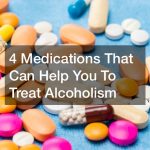
Recovering from alcohol and drug addiction can be an incredibly tough process, but medicine has advanced in fantastic ways. You no longer need to go cold turkey and suffer through withdrawal because drug rehab services have medications that can help you transition more easily into the person you want to become.
These medications will help prevent the real physical risks of stopping your drug usage, but they can only go so far. You’ll probably need more help, such as AA for alcoholics with mental health issues, as some conditions are the main reason why people turn to substances in the first place. Most of the time, alcohol was but a symptom of the primary disease, and you need to treat the real illness while overcoming the addiction.
Fortunately, AllCare treatment services are usually equipped with all the tools so you can recover fully. Their physicians and psychologists can help you get to the root of the problem and give you medications that will treat your actual disease. ARC recovery services go even further and provide housing and employment opportunities for their patients so they can return to society safely.
Let’s find out more about the medications you need to treat alcoholism and other recovery options.
There’s no getting around it: alcohol is a big problem. In fact, alcohol is the number one drug problem in the United States and it can can have crippling effects on a family
Approximately 53 percent of adults in the United States have reported that one or more of their close relatives has a drinking problem. In addition, more than 10 percent of children in the U.S. love with a parent with alcohol problems.
Those most vulnerable to problem drinking are young adults between the ages of 18 and 29, while those least susceptible are 65 years of age or older. Roughly 20 percent of college students meet the requirement for an Alcohol Use Disorder.
With the rise of drug and alcohol addiction, the numbers of people seeking treatment are on the rise as well. The National Survey on Drug Use and Health reported in 2015 that 8.1 percent or 21.7 million people needed substance use treatment in the last year.
On average, alcohol addiction patients receive treatment eight years after the age in which they develop the condition. There’s no magic formula that will stop a person from drinking, but alcoholism medications can be used to treat the disease.
Alcoholism medications such as these can help in the treatment of alcoholism, but it is important to balance alcoholism medications with a 12-step program or some sort of other social intervention or psychological intervention. Here are several alcoholism medications which can be effective in fighting the disease.

- Antabuse: This is one of the oldest alcoholism medications on the market and works by interfering with the body’s ability to absorb alcohol. Antabuse doesn’t stop a person from drinking, but it interferes with the production of acetaldehyde, an enzyme that helps in absorbing alcohol.
Using Antabuse creates a buildup of that enzyme, which in turn causes feelings of sickness. So the idea is that if you drink while taking Antabuse, you will get to a point where you feel sick. Taking Antabuse is best done with someone there to monitor the person taking it. - Campral: This medication is taken orally and helps alcoholics cope with the symptoms that accompany periods of not drinking like insomnia, anxiety and mood swings. Campral has been shown to increase the periods of time that alcoholics were able to stop drinking, but studies of its effectiveness have been mixed.
- Topamax: Similar to Campral, Topamax helps patients avoid or reduce symptoms that come with not drinking for long periods of time.
- Naltrexone: Another option when it comes to alcoholism medications is anchor naltrexone. This works by blocking receptors for endorphins, the proteins that the body produces to elevate mood. The goal of naltrexone is to break the happy feeling a person suffering with alcoholism feels when he/she drinks.
Alcohol medications can be of great use to people in need of treatment for alcoholism, but it is important that these medications be used in conjunction with other forms of treatment.such as a 12-step program or counseling.
